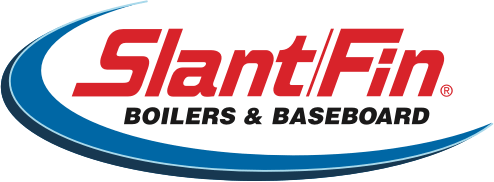No problem with Slant/Fin High Efficiency boilers.
Some people think that water quality is an issue only with Aluminum Heat Exchangers in boilers. Every heat exchanger, whether it is cast-iron, aluminum, or stainless steel, can be affected by sludge, calcium and magnesium buildup. Hard water tends to be scale forming; soft water tends to be corrosive. This is easily controlled. More about that later. Because heating  systems re-circulate the same water, there is little opportunity for new hardness salts to enter the system unless you have a leak! The small amount of hardness in a dosed system will tend to initially deposit itself on the heat exchanger of any type. The quality of the water is critical in all heat exchangers when using anti-freeze protection chemicals such as glycol, according to a leading manufacturer of glycol solutions. They also say that good quality water has less than 50 ppm of magnesium, 100 ppm of hardness, 25 ppm chloride and 25 ppm of sulfate. In an aluminum boiler, such as our Lynx or Jaguar models, the system water must have a ph range between 7.5 and 8.5 so using an inhibitor alone (for non freeze protected systems) or Glycol with inhibitor such as RhoGuard with ProTek 922 or NobusrtAL by Noble is recommended.
systems re-circulate the same water, there is little opportunity for new hardness salts to enter the system unless you have a leak! The small amount of hardness in a dosed system will tend to initially deposit itself on the heat exchanger of any type. The quality of the water is critical in all heat exchangers when using anti-freeze protection chemicals such as glycol, according to a leading manufacturer of glycol solutions. They also say that good quality water has less than 50 ppm of magnesium, 100 ppm of hardness, 25 ppm chloride and 25 ppm of sulfate. In an aluminum boiler, such as our Lynx or Jaguar models, the system water must have a ph range between 7.5 and 8.5 so using an inhibitor alone (for non freeze protected systems) or Glycol with inhibitor such as RhoGuard with ProTek 922 or NobusrtAL by Noble is recommended.
In stainless steel boilers of other major manufacturers, they too recommend using a cleaning solution, sludge removal and corrosion inhibitor when using glycol solutions. As noted above, good quality water should be used.
So whether you are installing a boiler with an aluminum heat exchanger, such as the Lynx or Jaguar, or our Stainless steel high efficiency boiler, such as VSL, or anyone else’s high efficiency boiler, start with good quality water, and use the proper cleaner and inhibitor, as recommended by the manufacturer. Remember to add the proper Glycol if needed.

